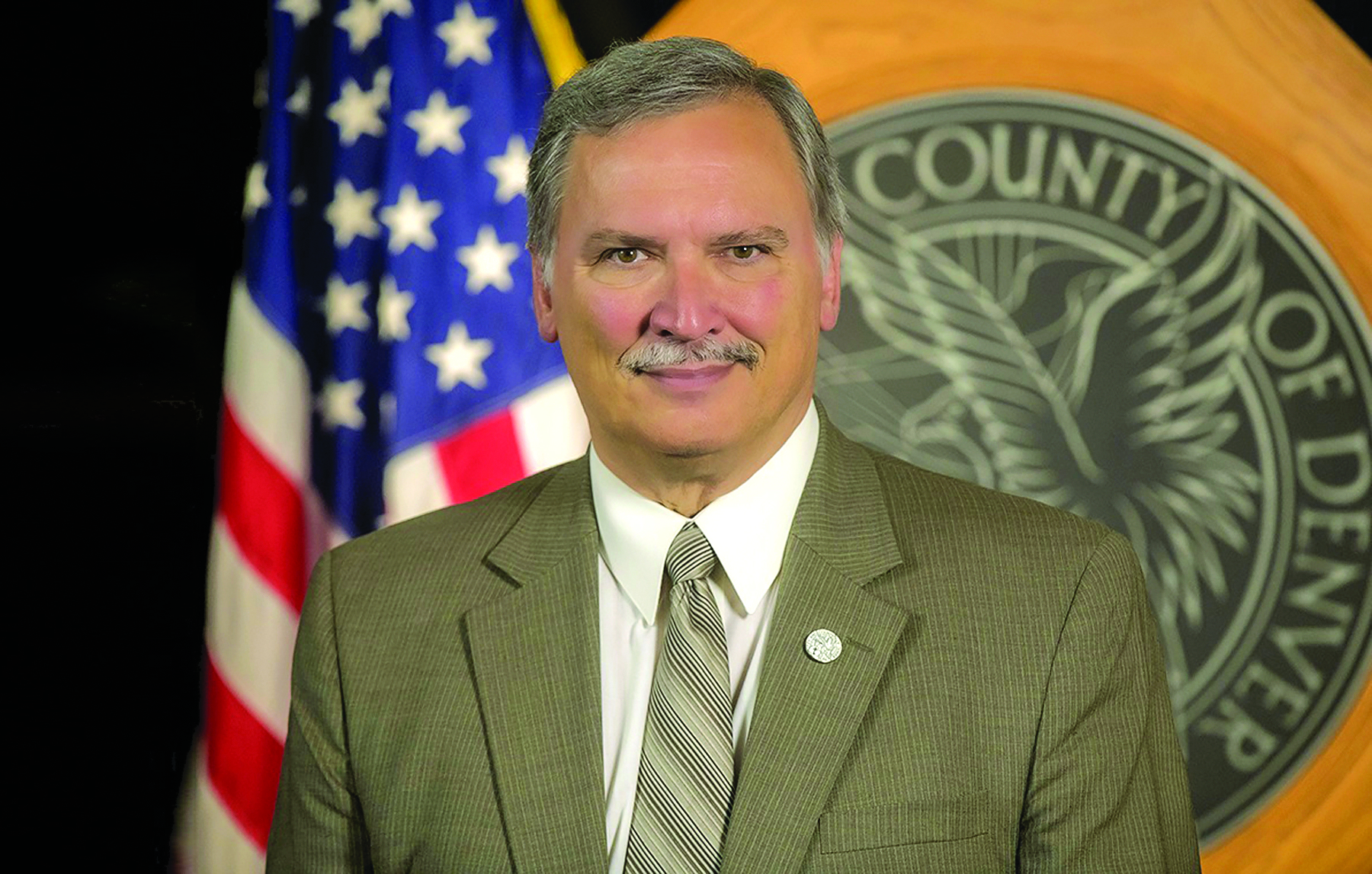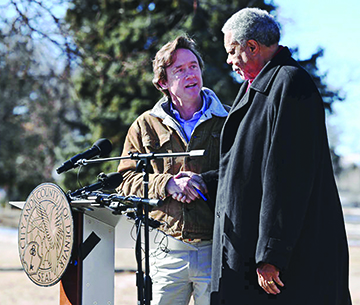
by Charles Bonniwell | May 16, 2025 | Main Articles
by Charles C. Bonniwell

Classic Development: The Belcaro Shopping Center was built in 1960 and considered a real asset to the adjoining Belcaro Park neighborhood. The Kentro Group’s proposed 12- to16-story low income apartments are considered by residents as little more than an eyesore that will acerbate traffic jams in the area.

Brave New Future: A once campus-like setting of the Colorado Department of Transportation facility is being replaced by the Kentro Group’s massive 103,000 square foot King Soopers and low income housing. The expected completion is Spring 2026.

High Density Development Coming Soon: Belcaro is an affluent neighborhood in Denver known for its large ranch-style homes and tree-lined streets. It is located between Cherry Creek and Washington Park, featuring the historic Phipps Mansion and a high average household income. It sits West of the proposed redevelopment on South Colorado Blvd.
The City and County of Denver is known for its extraordinary neighborhoods. Those neighborhoods are represented not only by city councilmembers, but also formal neighborhood associations (HOAs) formally recognized in the city statutes. Many of these neighborhoods are tree-lined sanctuaries that almost resemble suburban enclaves.
The neighborhoods, especially the ones dominated by single family homes, are dimly viewed by the progressive Denver city planners at the Denver Community Planning and Development Department. They are seen as being anachronistic and an impediment to the type of very high density needed for a “sustainable” future for Denver.
Developers, in turn, realize that a key to profitability for them is turning low density areas in Denver into high density ones which could result in greater possibilities for “affordable housing” in the city.

More 24-hour Traffic Coming Soon: Virginia Village is a neighborhood in Denver with a population of 16,326. Virginia Village offers a balanced lifestyle with ample green spaces and recreational facilities. Parks like Garland Park and Ash Grove Park provide residents with opportunities for outdoor activities. Now, it is coming under threat with a new 103,000 square foot King Soopers coming to town.
The battles between developers aligned with Denver city planners on one side and neighborhood residents on the other are breaking out throughout the city. At one time, neighborhood HOAs in Denver were politically powerful, but no longer. Occasionally, the residents win one of those battles (February edition of the Chronicle — “Park Hill Golf Course Miracle”). But those victories are few and far between.
One of those battles is going on along Colorado Blvd. Kentro Group, a Denver real estate developer, is engaging in two such developments that have outraged the Belcaro Park and Virgina Village neighborhoods. The development scheme involves reversing what the Denver city planners view as obsolete thinking of having commercial businesses and residential areas physically separated.
As they view it why not put residences in the form of affordable apartments on busy streets like Colorado Boulevard while moving high volume retail into or next to single family home areas?
King Soopers, a division of Cincinnati based Kroger Company, had operated a grocery store at a 7-acre site, 825 South Colorado Blvd., for over 65 years. It elected to close the store, sell the property to the Kentro Group, and build a new 113,000 square foot facility a mile south in the Virgina Village neighborhood. The 13.5-acre site on

The Campus: The old CDOT headquarters off Colorado Blvd. on Arkansas Avenue had a campus like aspect to it with no traffic after 5:30 p.m. or on weekends and fit in well within the Virginia Village neighborhood.
ce housed the CDOT campus headquarters between Arkansas and Louisiana Avenues and was purchased by the Kentro Group in 2018 for $19.3 million.
The site was zoned CMP-E12 or campus, educational/institutional site. It is limited to a maximum of 75 feet within 175 feet of protected areas, i.e. single-family homes. The idea that single family homes are to be protected is no longer a concept recognized by the Denver Planning Department. The entire property was quickly rezoned for high density apartments and commercial uses.
Kentro Group, with the blessing and encouragement of the Planning Department, built a four-story 151-unit low-income apartment complex called Krisana Apartments abutting the single-family homes. Next to it will be a 113,000 square foot new King Soopers that will generate high traffic and will stay open into the night to the detriment of the Virginia Village neighborhood.
Next up for Kentro Group and the progressive city planners was the redevelopment of the 7-acre Belcaro Shopping Center. Facing off against them were residents of the low-density, single-family neighborhood to the west of the old grocery store and an active Belcaro Park HOA.
At the preliminary development review meeting over a year ago the residents told Kentro Group and the city planners w

New Neighbor: Krisana is a 151-unit, 4-story apartment community located at Arkansas Avenue and Birch Street just east of Colorado Blvd. Krisana is now imposed on the Virginia Village neighborhood.
hat they thought of the 12- to 16-story low-income housing apartment building with first floor retail use.
The residents pleaded for a maximum of three stories redevelopment which appeared to fall on deaf ears. Kentro principal Chris Viscardi told the hostile crowd that “I think there’s an opportunity here.” Some agreed that there was an opportunity, but it was for the Kentro Group to help destroy a neighborhood for its own gain.
When later asked by a reporter for the Denver Gazette whether the city was the one pushing for a higher, denser project than what was originally envisioned, the Kentro Group conceded the same.
Sue Clinton, a Belcaro resident, stated at the meeting that: “The city is driving this change and not really listening to the neighborhood.” She noted that in her mind the neighborhood conveyed a suburban, rather than an urban feel, which the city planners wanted to alter.
Others noted that at one time city planners were the advocates for the residents of the city rather than its enemies seeking to destroy a way of life many have cherished for years.
With the Denver housing market already beginning to suffer and Downtown Denver badly struggling, some residents are beginning to wonder with developers like Kentro Group and city planners like those Denver Planning Department whether housing affordability will someday be the least of the city’s concerns such has occurred in cities back East.

by Charles Bonniwell | May 16, 2025 | Main Articles

Good Work: Rich Wyatt leads fundraising efforts in Colorado for the Tunnel to Towers Foundation to raise money for homeless veterans.

Hotel Conversion: The former Fairfield Inn on Colorado Blvd. will be converted into housing for veterans by Tunnel to Towers Foundation.
by Charles C. Bonniwell
The Tunnel to Towers Foundation founded by Frank Siller, in honor of his brother Stephen who died during the September 11 attacks in 2001, is a nonprofit foundation that supports families of fallen first responders and veterans while working to end veteran homelessness.
The organization is best known for retiring the mortgages for families of first responders who were killed in the line of duty. It also builds and gives mortgage free “tiny homes” (500 sq. feet) to eligible veterans.
Residences
Tunnel to Towers more recently has begun converting hotels into residences for homeless veterans in Atlanta, Memphis, Las Vegas, and now Denver. It plans to have six more properties purchased and remodeled over the next several years.
Tunnel to Towers acquired the Fairfield Inn hotel property at 1680 S. Colorado Boulevard (corner of Colorado Blvd. and East Mexico Ave. near I-25 and Colorado Blvd.) for $12.7 million in September of 2024.
It is to be converted into 120 apartments for homeless veterans in the Denver metropolitan area, The site will also feature support services including job training, benefit assistance, PTSD counseling, and addiction.
It is estimated that there are over 400 homeless vets in the Metro Denver area.
Fundraising
An additional 8 to 10 million dollars is estimated to be needed to convert and update the property.
In Colorado, fundraising is headed up by Rich Wyatt, who was a volunteer fireman, former police chief, and was featured in a reality TV show titled American Guns along with family members.
Wyatt became involved with Tunnel to Towers when his reality show, back in 2017, became very popular with disabled veterans. He would organize and lead gun adventures with disabled vets who had a high risk of suicide attempts, due to their inactivity caused by their disabilities, with little to look forward to.
On Wednesday, May 7, 2025, Wyatt held a breakfast fundraiser across the street at 3900 E. Mexico hosted by Dutton Commercial Real Estate. In addition, 710 KNUS Radio host Peter Boyles spoke at the fundraiser which was headlined by 9/11 fireman survivor Tim Brown who inspiringly talked about his experiences on 9/11.
Wyatt and Tunnel to Towers are looking for individuals who will host fundraisers at their homes or businesses. If interested in doing so, call Wyatt at 303-475-5007. For more information on the Tunnel to Towers Foundation, visit www.t2t.org.

by Charles Bonniwell | Apr 18, 2025 | Main Articles
City Council To Decide On June 30th Whether To Eliminate All Parking Requirements
by Charles C. Bonniwell

Parking Woes: Denverites may find it increasingly difficult to locate parking spaces around Denver if the City Council adopts a proposal to eliminate all parking requirements in the city.
The Denver Planning Commission has passed on a recommendation to the Denver City Council to let developers decide what, if any, parking will be provided for a project, and allow existing businesses and housing complexes to eliminate any and all existing parking requirements.
Denver has some of the least demanding parking requirements in the state with city ordinances requiring:
1 parking space per dwelling unit.
2 parking spaces per retail or office space.
4 parking spaces per thousand feet of a bar or restaurant space.
In comparison, the City of Glendale requires 1.5 parking spaces per dwelling unit, 4 per thousand feet of retail or office space and 11 per th

Flor Alvidrez: The Councilwoman for District 7 believes that by adopting the proposal for eliminating all parking requirements for Denver the city will be helping to fulfill its moral obligation to address climate change.
ousand feet of bar or restaurant space.
The Planning Board’s recommendation is strongly supported by Mayor Mike Johnston and various more progressive City Council members. “Let the market decide” is not a phrase often used by progressive politicians but is constantly invoked in this parking battle. Opponents have responded

Kevin Flynn: The District 2 Councilman worries the elimination of all parking requirements will result in fewer housing projects in Denver for families.
that, in fact, if “let the market decide” is a new guiding principle there is no reason for zoning laws or planning commissions to exist at all.
Rachel Marion, Denver Planning Board member, argued that doing away with all parking requirements would “open up a lot of creativity, development, and vibrancy downtown and in a number of spaces.”
One disputes that it would also result in far fewer empty parking spaces in various parts of the city and making it more difficult to drive to a Denver location. According to proponents of the proposal, such a result would be a positive and not a negative result of the proposal.
Progressives generally do not support the use of automobiles since, among other detriments, it increases the use of fossil fuels, which in turn increases global climate change. They argue individuals, if forced to, will walk, use bikes, or employ public transportation. City Councilwoman Flor Alvidrez has asserted, regarding the proposal, that Denver has a moral obligation to address climate change, and the proposal is one way to help address that obligation.
Not all members of Denver City Council are on board with eliminating all parking requirements. Councilwoman Amanda Sawyer has asserted that she has surveyed her constituents and concluded: “My residents don’t want this.”

Amanda Sawyer: The District 5 Councilwoman has stated her residents simply do not want the proposed elimination of all parking requirements for the City and County of Denver.
City Councilman Kevin Flynn noted that the proposal will limit new housing for families as parents with young children often depend on automobiles to take the entire family to a location.
The cost of providing a parking space is estimated to be $50,000 and thus developers generally seek to limit the number of spaces they need to provide. If possible, they prefer to cannibalize existing street parking but that may make it difficult not to clog up residential streets across the city.
In some residential streets, street signs have already appeared declaring parking on a particular street is restricted to “residents only.” Opponents of the proposal also fear that owners of apartment buildings. will see the proposal as an opportunity to build on lots for a cash infusion.
Colorado citizens living outside Denver are not immune from the desire by some to get rid of parking requirements. Last year, the Colorado Legislature passed a law HD 24-1304 which stopped local governments from enacting and enforcing minimum parking laws for apartments and other multi-family residential projects near high frequency bus and train lines in Colorado’s largest metro areas. It is anticipated that 15 home rule cities will file a lawsuit claiming that the law violates the state constitution regarding the powers of home rule cities in Colorado.
It has become clear that many politicians both locally and statewide view the use of automobiles by individuals as undesirable and it must be restricted to the greatest extent possible for the common good. Whether the citizens of Denver and Colorado concur has yet to be determined.

by Charles Bonniwell | Feb 19, 2025 | Main Articles
155 Acres Will Be A Permanent Park
Wellington Webb Hailed As A Hero
by Charles C. Bonniwell

Victor: Former Mayor Wellington Webb helped lead the years-long struggle to keep the old Park Hill Golf Course as Open Space and not a dense mixed-use development.

Coming Soon: The old Park Hill Golf Course will be converted into a regional park to open this summer.
A decades long battle on whether the 155 acres which comprised the old Park Hill Golf Course would be a permanent park and open space or paved over for a dense mixed-use development has finally reached a conclusion. The Park Hill residents overwhelmingly appeared wanting an open space park but aligned against them was a developer (Westside Investment Partners) who stood to make tens of millions of dollars from development with the strong backing and power of the mayor, City Council, and all of the agencies of city government. It appeared inevitable that the development would occur notwithstanding what the residents earnestly wanted. Citizens almost never win this type of battle yet this time it was different.
Opposing the developer/government juggernaut was an underfunded rag tag residents group by the name of Save Open Space Denver (SOS) in conjunction with former Denver mayor (1991 to 2003) and Park Hill resident Wellington Webb. Notwithstanding the David versus Goliath nature of the battle, on January 15 the present Denver Mayor Mike Johnston announced that the city had engaged in a land swap whereby Westside Investments would be given 144 acres of empty industrial zoned property near the Denver International Airport for the 155 acres of the old Park Hill Golf Course. The swap ensures that the Park Hill acreage would be a city park, the fourth largest in the City and County of Denver and the largest acquisition of park land in the city’s history. It makes certain that the entire greater Park Hill neighborhood will continue to be one of the gems of Denver. The tale of this miraculous victory by the residents over their own government and a powerful developer is one of the most heartwarming tales of 21st century Denver.
Park Hill
What is today the Greater Park Hill neighborhood began in 1887 when the German Baron von Winkler sought to subdivide 32 acres of land east of Colorado Boulevard for an upscale re

Clayton College Campus: The Clayton College campus was designed by Maurice Briscoe and Henry Hewitt in the Italian Renaissance Revival-style with sandstone masonry.
sidential neighborhood. The Silver Crash of 1893 greatly hindered his plans. In 1898 he committed suicide with the poison strychnine and a gun, but his dream of development would slowly be fulfilled.
Today, Park Hill, sometimes referred to as Greater Park Hill, has approximately 30,000 residents divided into three distinct neighborhoods running up Colorado Boulevard. It starts with South Park Hill running from 17th Avenue and ending at 23rd Avenue. It is predominately white, affluent,

Location: The new park will be at the southwest corner of the Northeast Park Hill neighborhood along Colorado Boulevard.
and contains some of the most beautiful homes in all of Denver. Next is North Park Hill which runs from 23rd Avenue up to Martin Luther King Jr. Boulevard (formerly 32nd Avenue). It is generally affluent but less than South Park Hill and is more evenly split between black and white residents. Further north is Northeast Park Hill which runs from Martin Luther King Jr. Boulevard to 53rd Avenue. It is largest of the three neighborhoods in size, but smallest in population and the least affluent. At one time Northeast Park Hill had an overwhelming black population. In recent years Hispanic and white residents have been increasingly moving in.
The Estate
The Park Hill Golf Course property is on the southwest corner of Northeast Park Hill starting on Colorado Boulevard and just north of Martin Luther King Jr. Boulevard. The story of the golf course goes back to 1889 when a successful businessman, George Washington Clayton, was found dead slumped over his desk. With his wife and child having predeceased him, he left his fortune and property to the city of Denver for the purpose of an orphanage for white boys born in Colorado from respectable families. Racism, class division, and corruption would be a constant theme regarding his estate and Park Hill. The estate was valued at $2 million dollars in 1889 which is equivalent to $75 million today and his estate included numerou

Jackpot Winner: Charlotte Brantley as CEO of the Early Learning Center came out as the big monetary winner regarding the old Park Hill Golf Course. She sold on behalf of the Early Learning Center/Clayton Trust a conservation easement on the Park Hill Golf Course but then turned around and sold the land to Westside for $24 million as if no conservation easement existed.
s real estate properties.
Federal judge Moses Hallett was made the executor of the estate and charged with creating the orphanage. In 1903 he was accused of mismanaging estate funds, including using assets for his own purposes, and illegally
paying himself from estate funds. Nonetheless, under his tutelage the construction of the orphanage was completed by 1910 to be called Clayton College for Boys and turned it over to the city in 1911.
The Golf Course
The estate became the George W. Clayton Trust with the City and County of Denver as the sole Trustee. The orphanage was housed i

Ceremony: Mayor Mike Johnston brings up to the podium the victorious former Mayor Wellington Webb at a January 15, 2025, press conference announcing the land swap and creating a regional park at the old Park Hill Golf Course.
n beautifully constructed buildings and called Clayton College for Boys. Across Colorado Boulevard from the buildings at Martin Luther King Jr. Boulevard was a 155-acre dairy used to help teach the orphans agricultural skills. The dairy farm operation ceased and in 1932 the land became the Park Hill Golf Course under a lease agreement with an operator.
The City and County of Denver as the sole Trustee proved to be no less corrupt than federal judge Moses Hallet. The city managers of the estate were found to be selling trust properties to friends and business associates at far below fair market prices and other acts of self-dealing. In 1982 the city was replaced by a foundation called the Clayton Foundation with no assets and a volunteer board to be the sole trustee of the Clayton Trust.
The orphanage was closed in 1957 due to the lack of boys fitting the restrictive provisions. In 1969 the Colorado Supreme Court court amended the provisions of the trust to eliminate the restrictions with regard to race, gender, and family background. In 1991 the Clayton Foundation became the Early Learning Center for the purpose of assisting low-income families with children from birth to three years old. In 1995 it became associated with the federal Head Start program. Critics have declared the program to be little more than a federally supported day care center whose main beneficiaries were the overwhelmingly white female teachers and administrators who paid themselves handsome salaries along with generous perks and pensions. It was ruefully noted that the Early Learning Center was as racially segregated as Clayton College for Boys with the white female teachers serving almost exclusively black and Hispanic families with no white male boys in the mix.
Like the managers and trustees before them, the white female teachers and administrators led by CEO and president Charlotte Brantley, were accused of attempting to convert the assets of the trust (the Park Hill Golf Course land) for their own benefit.
Marketing The Property
The 155 acres is located on the southwest corner of Northeast Park Hill. In the 1950s and 1960s real estate agents and bankers started a real estate stampede known as “white flight” by going door-to-door telling white residents that they needed to sell as soon as possible because blacks from Five Points were increasingly moving in causing property values to plummet.
Eventually many of Denver’s black political leaders came from Park Hill including Denver’s first black mayor Wellington Webb. In 1997, in order to prevent the land from being sold to developers to meet the money desired by the Early Learning Center, Webb arranged a deal whereby the city paid two million dollars to the Early Learning Center in return for a conservation easement on the land, whereby it was to remain a golf course or open space.
The Early Learning Center quickly blew through the 2 million dollars and soon hunted for more funding. In 2011 Micheal Hancock became the second black mayor of Denver, but unlike Webb had no interest in parks and open space and was almost universally deemed to be in the back pocket of developers. Neither the Hancock Administration nor Early Learning Center seemed to care that the property had a conservation easement for open space on it which the citizens wanted to keep. The Early Learning Center’s Brantley started talking about envisioning the 155 acres, but no mention of returning to the taxpayers the money it had taken.
In 2017, a convoluted agreement was drawn up with the city buying the land for $20 million and indicating the Early Learning Center would jointly develop the property. The agreement was so convoluted that the City Council balked.
Wellington Webb wrote: “In 2017 the Denver city administration and the landowner, Clayton Trust [managed by the Early Learning Center] , thought they would be able to terminate the conservation easement between themselves simply with a wink and a nod and city council approval. Had it not been for Arcis Golf, the company that operated the golf course crying foul, termination of that agreement would have flown under the radar, tucked into a measure for a vote by Denver City Council to approve the sale and development of that 155-acre, tree-filled green space.”
Before that litigation was resolved the state legislature enacted a new law in which an impartial judge would have to rule that conditions had to have changed so that the purposes for easement no longer existed. The legislation appeared to save the land as open space but no. A Denver judge would later rule quixotically that the citizens had no standing to enforce the easement.
The Rise Of Opposition
But the initial contract to sell and subsequent lawsuit alerted Park Hill residents that Park Hill Golf Course land would be paved over for development unless they organized and fought back. SOS was formed with the help of two lawyers, Penfield Tate III and Woodsey Garnsey, soon to be joined by Webb.
In 2018 the golf course was closed and in 2019 Clayton Early Learning announced that it had agreed to sell the land to Westside Investment for $24 million, which shocked observers since the property was worth about $3 million with the conservation easement. It was assumed the fix was in with the Hancock Administration agreeing to lift the easement and approve any redevelopment.
Westside and the City then went on a full-bore public relations campaign to get the public behind the redevelopment. The city hired a firm to poll what the citizens wanted for the area which unsurprisingly came out with affordable housing. SOS was able to show that reality using a push poll, whereby the questions led the person being polled to the conclusion that the poller wanted. The city also set up the Park Hill Golf Course Area Visioning Process whereby city staff would meet up with various neighborhood groups to work through what they wanted to do with the land. The city staff, of course, were not honest brokers, which was demonstrated when they threw SOS out of the process saying that only those who wanted redevelopment could participate and not groups hoping to keep the property as an open space park.
SOS however continued to be proactive. It put on the November ballot Ordinance 301 which would require a citywide vote approving the lifting of a conservation easement. Westside then also got Ordinance 302 on the ballot which required such a vote in all cases except Park Hill Golf Course. SOS crushed Westside at the polls with Ordinance 301 winning with over 60% of the vote and Ordinance 302 losing by the same margin.
Westside through generous campaign contributions directly and indirectly had control over a large majority of the 13-member City Council. Westside got its small area plan approved by an 11-2 margin. The City Council also hoped that a scheduled April 4 vote on lifting the conservation easement would be favorably influenced by the approved redevelopment plan.
With tens of millions at stake Westside threw in everything it could including the race card. Westside and the City proclaimed if the land was a park it would make the area far more attractive and “gentrify” the area. Gentrification was a code whereby affluent whites would buy up properties

Driving Force: Andy Klein, the founder and CEO of Westside Investment Partners employed every trick and artifice to turn Park Hill Golf Course into a mixed-use development but ultimately failed to overcome the Park Hill Residents desire for a park.
displacing blacks. It is the flipside of “white flight.” The Westside redevelopment plan provided significant affordable housing which would attract black buyers and keep the area with a majority of black residents.
Given the enormous resources Westside would pour into the racist flavored campaign, and how little SOS and the other neighborhood groups had to spend, it was assumed Westside would win. To the shock of many Westside lost badly with over 60% voting to keep the conservation easement.
The Stunning Swap
Wellington Webb and the neighborhood groups had stopped the redevelopment of Park Hill Golf Course by their incredible election victory but were not any closer to making it a park. Westside still owned the land subject to a conservation easement which allowed golf course operations as well as open space. In a pique of anger Westside fenced off the property and did minimal maintenance.
Westside also threatened to turn a part of the property into a multi-story Top Golf driving range serving alcohol with loud music. Mayor Hancock had declared that the city would never buy land for a park, as it was way too expensive for the city budget.
For open space advocates the long nightmare of Mayor Hancock was to be over in 2023, with the mayor term-limited out of office after 12 long years. But the leading candidates appeared no less unfriendly to parks and open space. While the two runoff candidates, Mike Johnston and Kelly Brough, agreed on very little but they did agree that the property should be redeveloped by Westside and not become a park.
It was therefore one last surprising turn of events concerning the Park Hill Golf Course when Johnston announced on January 15 of this year that Denver was acquiring the land for 144 acres of industrial zoned land close to the Denver International Airport to swap for the old Park Hill Golf Course. The 155 acres will become a regional park improved and maintained by Denver Parks and Recreation.
At the press conference the mayor recognized Penfield Tate and Woody Garnsey of SOS and brought up Wellington Webb to a hero’s welcome.
The residents had, against all odds, “beaten city hall.” Future generations of Park Hill residents will be the beneficiaries of the unbelievable fight and victory of Wellington Webb, SOS, and an intrepid band of fighter residents from the Park Hill neighborhood.

by Charles Bonniwell | Jan 16, 2025 | Main Articles
by Charles C. Bonniwell

Bull & Bush Expansion: The tent was established during the Covid 19 era with the assistance of the City of Glendale and still stands today for overflow customers.
It is widely acknowledged that one of the joys of urban living is the availability of a wide array of restaurants of all different types and cuisines. But it has been extensively reported that many Denver restaurants are suffering with the number of restaurants dropping a whopping 22% since 2021 according Denver’s Department of Excise and Licenses.
At the same time according to the sales tax records of the city of Glendale, which is completely surrounded by the city of Denver, the restaurants have been experiencing steady growth every year since 2021.

Popular Restaurant Owner: Paul Sullivan, owner of Esters Neighborhood Pub operates two locations in Denver, and one in Wheat Ridge.
Minimum Wage
One of the key reasons for the disparity is the minimum wage differential for tipped employees between the two cities. Denver imposes a minimum of $15.79 per hour compared to $11.79 per hour in Glendale. Moreover, Denver has a very complex set of rules concerning what the minimum wage entails. Denver restaurants have had to pass those added costs to the customers who are price sensitive these days or suffer on the restaurants’ bottom line.
“The tipped minimum wage has ripple effects,” said Paul Sullivan, owner of Esters Neighborhood Pub. “We have cut back significantly on benefits that we offer to our co-workers that we had offered for years, we have reduced the number of people and the number of hours, and we are still making less money because of the tipped minimum wage. This comes directly out of the operator’s bottom line and that crushes us.”
COVID 19

Restaurateurs: Steve Lemonidis, General Manager of Reivers Bar & Grill (right), and Dave Peterson, co-owner of the Bull & Bush Brewery in Glendale, have different experiences when operating in their respective cities.
COVID 19 badly hurt restaurants throughout Colorado starting in 2020 but Denver’s approach was far more harmful than Glendale’s. According to Glendale restaurant owners the city tried to ameliorate the draconian restrictions imposed by the Tri County Health Department (who had jurisdiction over the city) and led the fight to in fact dissolve Tri County Health due to its draconian bureaucratic approach to the crisis.
David Peterson, co-owner of the Bull & Bush Brewery in Glendale, said, “During COVID, we put up a giant 100-person heated tent because, for a time, you could only serve food and drink outdoors. The permitting process in Glendale was extremely simple and took about 10 minutes and the permit was granted immediately for a change of premise liquor license.”
“To this day, we still use the tent as overflow,” said Peterson. “The city came to me and suggested altering the change of premises from temporary to permanent. That way, I didn’t need to reapply every year. They [the city] were proactive in something I should have been proactive in.”
The attitude of Denver was quite the opposite according to Steve Lemonidis the general manager of Reivers Bar & Grill in the Wash Park neighborhood of Denver. The city, he indicated, refused to educate his staff on exactly what the rules were but simply sent in inspectors who constantly handed out citations. For his restaurant the myriads of citations totaled $53,000 and failure to pay immediately would have resulted in revocation of the liquor license and the closure of the business.
“There was no explanation on where the restrictions came from,” said Lemonidis. “Yet, our mayor [Hancock] was on an airplane on Thanksgiving morning telling us all not to be with our families, but yet he was on an airplane to fly to see his family on Thanksgiving Day. It seems like the city was talking out of both sides of their mouth and it hurt us.”
The bureaucratic, almost anti-business, attitude toward restaurants is somewhat surprising given the fact that Denver’s most noted recent mayor (2003-2011) U.S. Senator John Hickenlooper was a restaurateur, as owner of restaurants such as Wynkoop Brewery, Wazee Supper Club, and Cherry Cricket.
But his successor, Michael Hancock, was attentive to the needs of real estate developers and not much else, while the new mayor Mike Johnston concentrates his administration’s efforts on the homeless who do not go to restaurants very often.
As Troy Guard the owner and chef of Guard and Grace told the Colorado Sun, “Honestly, I love Denver … But it’s becoming more and more difficult to open restaurants.”
Red Tape

Glendale: Bull & Bush Brewery opened their restaurant in Glendale in 1971. It is the oldest restaurant in Glendale. Photo by Mae Lynn Photography
One of the reasons businessmen do not want to open a restaurant in Denver these days is the enormous amount of red tape involved in building permits, inspection reviews, construction restriction, greenhouse gas rules, etc. Denver estimates the time to go through its process for a new restaurant is eight months, but those who have undergone the process say that a year or more can be anticipated.
In Glendale the process can be completed in weeks. Dave Peterson of the Bull & Bush noted he recently had to install a new roof and had to get the approval from the City of Glendale and Xcel Energy. When he indicated that he thought if he called the city he could get an inspection that afternoon the Xcel Energy official he was working with (who was used to working in Denver) laughed saying it would take weeks if not months to schedule an inspection. Glendale came over that afternoon, and as a result the restaurant had to close only half a day for the roof replacement.
Parking
An ever-growing problem for Denver restaurants in various parts of the city is ever diminishing parking in Denver. The city’s goal is to make parking increasingly difficult to force its citizens, and anyone traveling to Denver, to take public transportation for the purpose of limiting greenhouse gases and other societal goals.
Glendale, on the other hand, has not only not decreased parking but is expanding it. Glendale is presently finishing a seven story 1,200 car garage facility on Virginia Avenue to help its Four Mile Entertainment District which will house various restaurants and bars.
Glendale’s City Manager Chuck Line stated that: “We are taking the exact opposite approach from Denver. I believe restaurants and other businesses in Glendale will prosper because of it.”

Denver: Esters Neighborhood Pub opened their location in Virginia Village over nine years ago (pictured) and their location in Park Hill six years ago. Photo by Mae Lynn Photography
Crime And Homelessness
Restaurants in various parts of Denver such as Downtown suffer from the perception that they are not in a safe area and suffer from the homeless encampments. On the night of January 11, 2025, a 24-year old man stabbed four people on the 16th Street Mall, killing two. Pro forma statements about Downtown safety by Mayor Mike Johnston did little to improve the adverse publicity.
In Glendale there are simply no homeless encampments, Dave Peterson notes that the Glendale police respond to calls in minutes. He knows of no-one who feels unsafe in Glendale.
Look Toward The Future
Paul Sullivan who owns two Esters Neighborhood Pubs in Denver opined, “The cost of doing business recently, in the city of Denver specifically, is not sustainable at the current moment. There are a few different reasons, and it is sort of like death by a thousand cuts. There is a lot of stuff coming at us in the city of Denver.”
The fact that there are still over 2,000 restaurants in Denver is a testament to the resilience of the restaurant community in the city. However, it is difficult to see why the number of restaurants in the city will not continue to drop unless and until Denver’s Mayor Mike Johnston and his Administration decide to reach out to restaurateurs and start to address their many concerns on how the city operates with regard to its restaurant industry.
Glendale, on the other hand, appears to be poised to undergo boom times such as it hasn’t experienced since the 1970s.


























